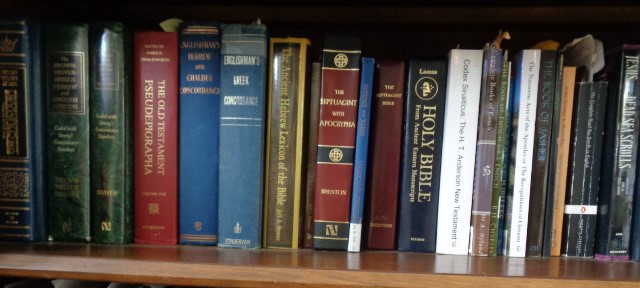Messyanic Bible Academy

Learn What the Bible Literally Says and Determine for Yourself What to Believe
|
With all sorts of Bible-based teachings out there whose aim is to tell you what to believe, my primary aim is to encourage you to learn what the Bible literally says, and then allow you to determine for yourself what to believe. While reading the Bible yourself is a great start in learning what it has to say, and I encourage one and all to do this, I believe there is greater understanding to be had when we study what we are reading. But many don't know how to study the Bible for themselves. So I began to compile my own Bible Study Workbooks to demonstrate how I personally study the Bible. Not Your Typical Bible Study GuidesThese Bible Study Workbooks are meant to simply encourage the study of what the Bible says, regardless of previous Bible exposure. No prior knowledge of the Bible is necessary. Also, there is no religious agenda: these workbooks do not promote Judaism, Christianity, or any other institution of man claiming to be founded on the Bible or any part thereof. They simply guide the reader in studying the text of the Bible. While these workbooks are focusing on areas that I have personally studied, I have done my best not to incorporate my personal interpretations into the material. I do share personal tips and advice here and there, but for the most part each Study Workbook is very light on personal commentary. Now, unlike other Bible studies out there, many of the courses offered here will challenge the status quo. Your attention will be directed to definitions of the words used in the source language and to their root meanings, and you will be asked pointed questions. Exercises have been created to help you think outside of the box, because let's face it, most of us have had some exposure to what the Bible says, and usually it has been through word of mouth and through a particular paradigm. And it is very difficult to approach the book objectively, even when we want to. These workbooks will help you. And finally, the Bible is set up to be read and studied in a certain order with the Hebrew book called "B'reshiyt", which means "In the Beginning", being the first book of the Bible. And then a series of events unfold over the course of the rest of the Bible. Having grown up in Christianity, I found myself focused more heavily on learning the New Testament than the Old Testament. And when I did venture into the Old Testament, it was usually through the paradigm of what I was taught concerning the New Testament. I was kind of embarrassed at the age of 40+ to discover how little I understood regarding the history of Israel. I realized then I had to start over in my Bible education. Given this, I feel very strongly about encouraging folks to approach the Bible with a clean slate and more systematically, to start your study in the beginning with the book of Genesis and build line upon line, precept upon precept. Don't Go It AloneIt can be kind of difficult to discipline yourself to stay the course in doing a Bible study without someone to encourage you along the way and to hold you accountable to stick with it. So, I encourage you to find an accountability partner who will keep you on course. I even suggest finding someone willing to take the course with you, so you can share what you are learning with each other and compare notes. You can bounce ideas off each other, and perhaps inspire one another with your differing perspectives or similar conclusions. Here is what is currently being developed:
While these study workbooks are provided with my name on it, they are not compilations of my notes. They are workbooks containing Bible references, vocabulary words and activity sheets for you to complete, where you make your own notes. Does this sound like something you might be interested in? >> Start with GENESIS 101 |